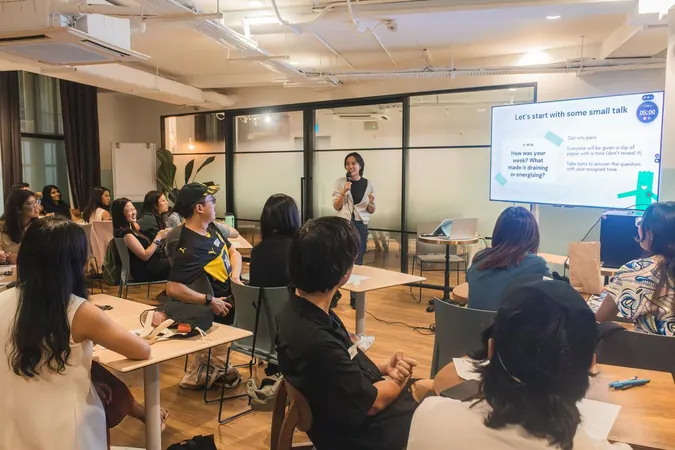
Unlocking Conversations: Young Singaporeans Learn the Art of Talking
2025-07-11
Author: Yu
The Communication Crisis of a Generation
In Singapore, 31-year-old IT professional Ms. Faith Tay faced an all-too-common modern dilemma during a Zoom meeting: the paralyzing fear of speaking up. After almost an hour of discussion, when it was finally her turn to shine, her mind went blank, and silence filled the virtual room. "Faith, are you okay?" a colleague inquired, but she could only nod, feeling overwhelmed as a teammate stepped in to present for her. This moment became a wake-up call for faith, leading her to seek new opportunities and personal growth.
Finding Confidence Through The School of Yapping
Determined to break free from her conversational struggles, Ms. Tay enrolled in the School of Yapping—a workshop designed to help young adults between 20 and 35 reclaim their confidence in social settings. This immersive, four-part course, organized by the local social enterprise, Friendzone, began in June at a vibrant venue on Keong Saik Road. For just $120, participants engage in practical learning sessions that include role-playing and group scenarios, focusing on vital conversational skills.
From mastering small talk to effectively reading social cues, the curriculum is designed after thorough research, including interviews with young adults to pinpoint their communication hurdles. The emphasis is on building self-confidence, minimizing awkward moments, and learning to navigate social situations gracefully.
A Growing Community of Conversational Learners
Since its inception in 2018, Friendzone has hosted over 500 events catering to the need for social connection among young individuals. Responding to alarming trends revealed by a 2024 survey by the Institute of Policy Studies, which found that young adults aged 21 to 34 experienced significant levels of social isolation, Friendzone secured over $50,000 in funding to expand their course offerings, including friendship sustainability and workplace communication.
Interestingly, about half of the School of Yapping participants are in professional roles, with a significant proportion being women. Moreover, the group’s diverse representation includes students and those identifying with social anxiety or neurodivergent traits.
The Pandemic: A Catalyst for Social Withdrawal
The COVID-19 pandemic exacerbated issues surrounding social interaction. Many participants, like 27-year-old Mr. Vishal Bajpe, joined the course to prepare for professional networking events, admitting they often retreat into silence rather than engage with strangers. Modern surveys indicate that those under 40 are more likely to avoid social gatherings compared to older generations, emphasizing a pressing need to reconnect with interpersonal communication.
Mental Health Implications and Professional Insights
Health professionals highlight the growing trend of low confidence and heightened anxiety among young adults when facing direct interactions. Dr. Lim Boon Leng, a psychiatry expert, notes that young patients are increasingly overwhelmed by the fear of judgment, which is heightened by social media dynamics. This trend points to a reliance on screens that can lead to deteriorated social skills and reluctance to engage.
Clinical psychologist Dr. Annabelle Chow elaborates that many young people now struggle with non-verbal cues, resorting to holding their smartphones as a safety mechanism during confrontational encounters. The transformation brought on by the pandemic, alongside the prevalence of these communication barriers, has left many feeling socially deconditioned and unsure how to reconnect meaningfully.
Path to Recovery: Strategies for Building Confidence
To combat these challenges, experts recommend approaches like exposure therapy, where individuals gradually immerse themselves in social environments, honing their skills in low-pressure situations. Cognitive Behavioral Therapy (CBT) also offers a pathway to reframing negative thoughts associated with social anxiety, encouraging young adults to focus on the present interactions rather than perceived judgments.
As the School of Yapping fosters a new wave of communicators ready to tackle their social fears, it stands as a testament to the resilience and determination of a generation poised to reclaim their conversational comfort.


 Brasil (PT)
Brasil (PT)
 Canada (EN)
Canada (EN)
 Chile (ES)
Chile (ES)
 Česko (CS)
Česko (CS)
 대한민국 (KO)
대한민국 (KO)
 España (ES)
España (ES)
 France (FR)
France (FR)
 Hong Kong (EN)
Hong Kong (EN)
 Italia (IT)
Italia (IT)
 日本 (JA)
日本 (JA)
 Magyarország (HU)
Magyarország (HU)
 Norge (NO)
Norge (NO)
 Polska (PL)
Polska (PL)
 Schweiz (DE)
Schweiz (DE)
 Singapore (EN)
Singapore (EN)
 Sverige (SV)
Sverige (SV)
 Suomi (FI)
Suomi (FI)
 Türkiye (TR)
Türkiye (TR)
 الإمارات العربية المتحدة (AR)
الإمارات العربية المتحدة (AR)